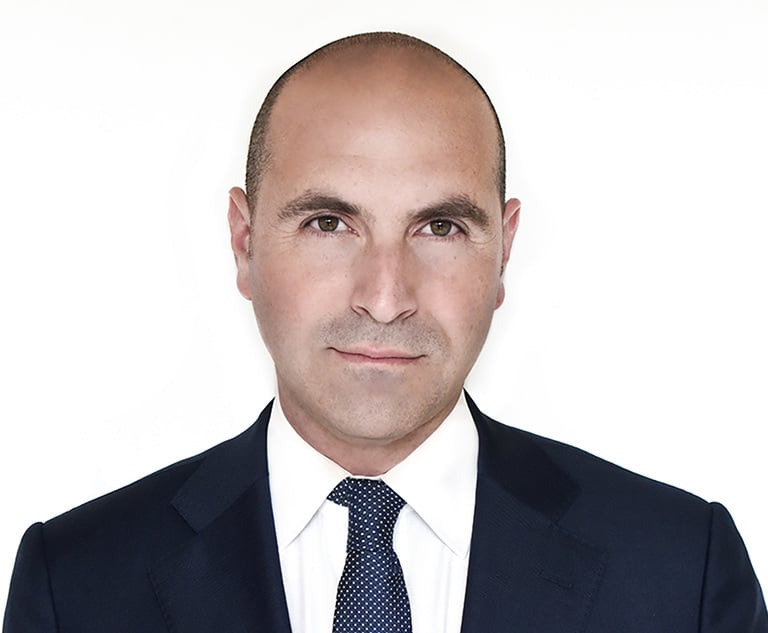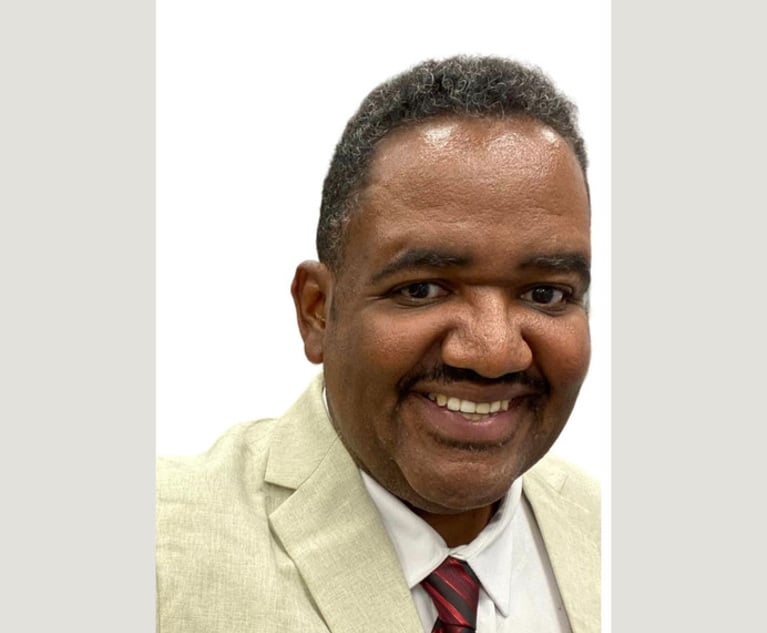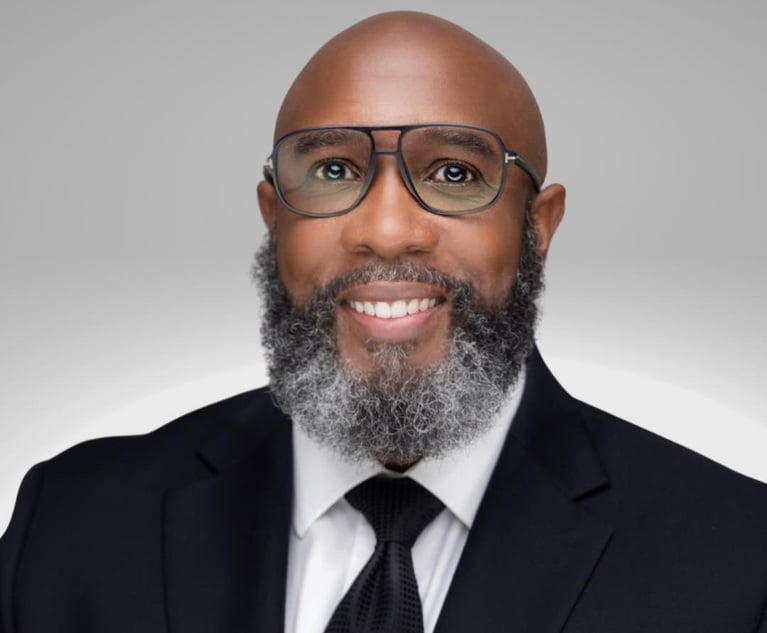Meet Monique Hayes: The Bankruptcy Lawyer Indebted to Miami
"I want people to stay in Miami and make it better, not just use it for vacation," said Monique D. Hayes, partner at Goldstein & McClintock, and president of the Wilkie D. Ferguson Jr. Bar Association.
August 17, 2018 at 02:02 PM
7 minute read
 Monique Hayes, of Goldstein & McClintock, and president of the Wilkie D. Ferguson Jr. Bar Association. Courtesy photo
Monique Hayes, of Goldstein & McClintock, and president of the Wilkie D. Ferguson Jr. Bar Association. Courtesy photo
On any given weekday, tucked away in a glossy Miami Tower suite amid a throng of high-rises, is bankruptcy lawyer Monique D. Hayes, a Goldstein & McClintock partner from Liberty City.
And she's on a mission.
“I do this to make money, but I make money in order to be able to take care of people and make my city, Miami, a little bit better. I want people to come here and believe that they can start a business and that they can invest without getting defrauded,” Hayes said.
As a child, Hayes' home life was crowded, buzzing with siblings and extended family, but it was also was marred by violence that followed her family even after they swapped Liberty City for the suburbs.
Her father, originally from Cuba, was shot and killed when she was 13. Hayes also lost her brother to gun violence in 2007, and two twin cousins who were murdered in 2012 and 2013.
“Even though you can move from a place, unless your entire world is able to move from that space, you're not going to be unaffected by it. It doesn't matter if I move to Brickell. If I have a family member that still lives in Liberty City, theres a chance that I'm going to have to go to a funeral next week and see a kid buried,” Hayes said.
For that reason, Hayes said she deliberately didn't practice criminal law.
But she considers herself lucky.
“I had a lot of teachers and women around me that would encourage me and tell me they thought I was smart and that I could do anything I wanted,” she said. “I couldn't have won the lotto to get better mentors.”
Hayes' mentor while in law school at the University of Miami was Patricia Redmond of Stearns Weaver Miller Weissler Alhadeff & Sitterson, widely considered a giant in the bankruptcy world. Hayes also had the chance to learn from civil rights lawyer Marilyn J. Holifield of Holland and Knight in Miami, who took on prison reform and employment litigation in the Deep South for the NAACP Legal Defense Fund.
As a young lawyer, Hayes was the first clerk to serve now-Chief Bankruptcy Judge for the Southern District of Florida Laurel Myerson Isicoff.
“To me, you don't just make money to live in a fancy house and have a glamorous lifestyle. It's so that you can do well and do good,” Hayes said.
At Goldstein & McClintock, Hayes specializes in corporate restructuring.
“That's just a fancy word to say business bankruptcy,” she said.
For the past two years, Hayes has focused on developing a practice that encourages innovation and technology to flourish in Miami, helping companies and entrepreneurs to initiate, grow or stabilize their business. She is also president of the Wilkie D. Ferguson Jr. Bar Association, named after another Liberty City figure, the first black judge to serve in the Third District Court of Appeals.
As bar president, her priority is social and economic justice.
“That includes making sure that black lawyers have access and opportunities to have economic independence. That means they can develop clients, have the skills and the resources to have their own book of business. And it also means they can provide legal and advisory services to the community, including the black community, which doesn't often get expert-level legal services,” Hayes said.
The way Hayes sees it, Miami is the “best of all worlds,” and its immigrants are its greatest economic strength.
“So many people come here hungry, literally and figuratively, and they're the innovators. That's the thing about people who don't have anything. They can make anything,” Hayes said.
Hayes entered law school to become an FBI agent, before realizing, “I was not the type of person that would be able to follow orders that well.” She then set her sights on practicing law in the sports and entertainment sector.
Instead, she fell into the bankruptcy field, where “everything happens.”
And as chance would have it, many of the cases Hayes handles are sports- and entertainment-related because several National Football League and National Basketball Association players end up in bankruptcy.
“The statistics are really striking. Because they don't get the financial skills training a lot of the time, they can be susceptible to fraud or mismanaged because of their lifestyle. They're always busy and depending on other people to take care of all of those details,” Hayes said.
One of the biggest cases she's tackled involved picking up the pieces after record producer Lou Pearlman's multi-million-dollar fraud. In addition to promoting “boy bands” like NSYNC and Backstreet Boys, Pearlman ran a phony travel company, which fell apart in 2007.
When Pearlman was arrested, his assets went into a bankruptcy case in which Hayes' client, Soneet Kapila Mukamal, was the trustee.
“I was just praying that I'd have to take a deposition with Justin Timberlake, trying to make up a reason why, 'Oh, I think I need to interview him to find out what happened here,'” Hayes quipped.
But Hayes acknowledges that no matter how far she takes her practice, she can't forget the social issues affecting her immediate community, including gun violence among young people.
“It affects whether businesses are going to want to come here, because they need to feel safe. That's something we all have to be responsible for,” Hayes said.
She believes Miami's problems are multi-layered, stemming from years of disparity and institutionalized racism.
“It's a (disjuncture) that develops after so many generations of blight, lack of opportunity and belief in the American Dream I believe in so much,” she said. “People in some communities have been told and shown that they cant even get a start. They just come to a point where, not only do they not value their life, they don't value life at all because we as a society have given them the impression that their life doesn't have value.”
But ultimately, bankruptcy law has taught Hayes that it's never too late for a new beginning.
“Our country was built on the principle of having a fresh start. Our Founding Fathers funded the Revolutionary War to get independence, but because of that they were in debt,” Hayes said.
If they had kept the British system, Hayes acknowledged, the Founding Fathers would have ended up in debtor's prison. So they wrote bankruptcy laws into the U.S. Constitution.
“One of the principles of this country is that people can take risks, and sometimes they're going to fail. But we cannot put them in prison for that. We need to encourage them. As long as they're being honest and fair, they can make a mistake and start back over. That's my job,” Hayes said.
But according to Hayes, setting a city up for success doesn't require a law degree.
“I don't need to tell you what type of law you need to change, what type of investment you need to make, what type of associations you have,” she said. “All you have to do is be a little bit more human.”
Monique D. Hayes
Born: Miami, 1979
Education: University of Miami School of Law, J.D., 2004; University of South Florida, B.A., 2001
Experience: Goldstein & McClintock, 2017-present; The Hayes Firm, 2016-2017; Genovese, Joblove & Battista, 2007-2015, Law Clerk to U.S. District Judge Laurel M. Isicoff, 2006-2007; Legal Services of Greater Miami, 2004-2006.
This content has been archived. It is available through our partners, LexisNexis® and Bloomberg Law.
To view this content, please continue to their sites.
Not a Lexis Subscriber?
Subscribe Now
Not a Bloomberg Law Subscriber?
Subscribe Now
NOT FOR REPRINT
© 2025 ALM Global, LLC, All Rights Reserved. Request academic re-use from www.copyright.com. All other uses, submit a request to [email protected]. For more information visit Asset & Logo Licensing.
You Might Like
View All
Growing Referral Network, Alternative Fees Have This Ex-Big Law’s Atty’s Bankruptcy Practice Soaring
5 minute read
Against the Odds: Voters Elect Woody Clermont to the Broward Judicial Bench
4 minute read
Miami Civil Judge Myriam Lehr to Say Goodbye to the County Court Bench
4 minute readTrending Stories
Who Got The Work
J. Brugh Lower of Gibbons has entered an appearance for industrial equipment supplier Devco Corporation in a pending trademark infringement lawsuit. The suit, accusing the defendant of selling knock-off Graco products, was filed Dec. 18 in New Jersey District Court by Rivkin Radler on behalf of Graco Inc. and Graco Minnesota. The case, assigned to U.S. District Judge Zahid N. Quraishi, is 3:24-cv-11294, Graco Inc. et al v. Devco Corporation.
Who Got The Work
Rebecca Maller-Stein and Kent A. Yalowitz of Arnold & Porter Kaye Scholer have entered their appearances for Hanaco Venture Capital and its executives, Lior Prosor and David Frankel, in a pending securities lawsuit. The action, filed on Dec. 24 in New York Southern District Court by Zell, Aron & Co. on behalf of Goldeneye Advisors, accuses the defendants of negligently and fraudulently managing the plaintiff's $1 million investment. The case, assigned to U.S. District Judge Vernon S. Broderick, is 1:24-cv-09918, Goldeneye Advisors, LLC v. Hanaco Venture Capital, Ltd. et al.
Who Got The Work
Attorneys from A&O Shearman has stepped in as defense counsel for Toronto-Dominion Bank and other defendants in a pending securities class action. The suit, filed Dec. 11 in New York Southern District Court by Bleichmar Fonti & Auld, accuses the defendants of concealing the bank's 'pervasive' deficiencies in regards to its compliance with the Bank Secrecy Act and the quality of its anti-money laundering controls. The case, assigned to U.S. District Judge Arun Subramanian, is 1:24-cv-09445, Gonzalez v. The Toronto-Dominion Bank et al.
Who Got The Work
Crown Castle International, a Pennsylvania company providing shared communications infrastructure, has turned to Luke D. Wolf of Gordon Rees Scully Mansukhani to fend off a pending breach-of-contract lawsuit. The court action, filed Nov. 25 in Michigan Eastern District Court by Hooper Hathaway PC on behalf of The Town Residences LLC, accuses Crown Castle of failing to transfer approximately $30,000 in utility payments from T-Mobile in breach of a roof-top lease and assignment agreement. The case, assigned to U.S. District Judge Susan K. Declercq, is 2:24-cv-13131, The Town Residences LLC v. T-Mobile US, Inc. et al.
Who Got The Work
Wilfred P. Coronato and Daniel M. Schwartz of McCarter & English have stepped in as defense counsel to Electrolux Home Products Inc. in a pending product liability lawsuit. The court action, filed Nov. 26 in New York Eastern District Court by Poulos Lopiccolo PC and Nagel Rice LLP on behalf of David Stern, alleges that the defendant's refrigerators’ drawers and shelving repeatedly break and fall apart within months after purchase. The case, assigned to U.S. District Judge Joan M. Azrack, is 2:24-cv-08204, Stern v. Electrolux Home Products, Inc.
Featured Firms
Law Offices of Gary Martin Hays & Associates, P.C.
(470) 294-1674
Law Offices of Mark E. Salomone
(857) 444-6468
Smith & Hassler
(713) 739-1250







